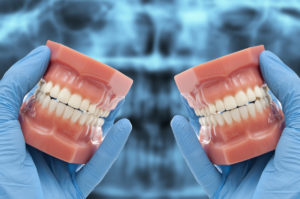
In our blog this week, we are here to teach you about the different types of bite patterns and why they are important. I am sure that you have heard the words overbite or underbite before, but do you know what these words mean? Do you know what type of bite is considered normal? Here At Ponte Vedra Complete Dentistry, we are devoted to patient education and one of the ways that we constantly teach our patients about all things dentistry is with our weekly blogs. According to the American Dental Association, abnormal bites usually become noticeable between the ages of 6 and 12, once the adult teeth begin to erupt. Often times, it is best to treat these abnormal bites when children are between the ages of 8 and 14 and still growing. It is never too late, however, to fix a bad bite and the results of treatment could drastically improve your quality of life.
Dr. Harth and Dr. Townsend have completed extensive training in the field of occlusion, which is the study of how the teeth come together. They both focus on providing dental work that corrects or maintains proper jaw relations, which is extremely important for jaw and tooth health and stability. In this article, we will teach you about the different types of bites, the consequences of a bad bite, and what your dentist can do to fix or maintain your bite. We hope that this will help you to understand the importance of a proper bite, also known as an occlusal relationship. We are always accepting new patients from in and around the Ponte Vedra Beach community and have had many satisfied patients over the years. If you have any lingering questions or would like to schedule your first appointment, please contact us at any time electronically or call (904)285-7711.
What Are The Different Types of Bites?
Normal
In a normal bite, the top teeth, also known as the maxillary teeth bite a little bit over the bottom teeth, or the mandibular teeth. The back molars fit together like puzzle pieces for efficient chewing and biting.
Overbite
In an overbite, the upper teeth bite over and in front of the bottom teeth. A person with an overbite may be described as having large teeth or “buck teeth”. They may also develop problems by accidentally biting or sucking their bottom lip.
Underbite
A person with an underbite will have their lower teeth protruding in from of the top teeth. People with underbites may appear as if they have very large lower jaws compared to smaller upper faces.
Crossbite
When someone’s teeth are in crossbite, this means that the upper and lower jaws are misaligned in some or all areas. One or more of the upper teeth will bite inside the lower teeth. This can cause problems such as cheek or lip biting and can take place on the front or sides of the mouth.
Openbite
An underbite occurs when the teeth are unable to contact each other during a normal bite or chewing stroke. This can happen between some or all of the teeth. With an openbite, speech and chewing can be difficult because the teeth never actually touch one another.
What Can Happen If My Bite Is Off?
Naturally, your jaw joints and teeth work in harmony to bite together, speak, chew and smile. However, when this relationship becomes out of balance, devastating effects can take place. Your bite can be off because of many reasons, including crowded teeth, crooked teeth, improperly fitting fillings or crowns, or abnormal or uneven jaw growth. If jaw problems and crowding are not fixed at a young age, they can cause problems later in life. These problems include tooth pain, excessive tooth wear, loose teeth that may fall out, sore muscles, ligaments, or tendons of the jaw and neck, broken teeth, and gum recession. The teeth are important protectors of the jaw joint, also known as the temporomandibular joint (TMJ), and vice versa. Problems with the teeth can cause problems in the TMJ and TMJ problems can sometimes affect the teeth. For more information on jaw pain, please watch the following video from the American Dental Association.
How Can My Dentist Fix My Bite?
If you think that there is a problem with your bite, it is important to schedule a consultation with your dentist. Your dentist will help you to determine the best course of action in treating your teeth, jaws, or a combination of both. Treatment may involve orthodontics or braces, oral surgery, splint or nightguard therapy, modification or replacement of crowns or fillings, habit modification, or physical therapy. Your dentist will need to perform a comprehensive work-up to determine the correct treatment and treatment order to address your needs and wishes.
We hope that you learned something new today and encourage you to share in with your friends. After reading this, you may begin to think more about the type of bite that you have and begin to notice other peoples’ bites when they smile. If you have any questions or to schedule a consultation, please contact us at any time electronically or call (904)285-7711.



